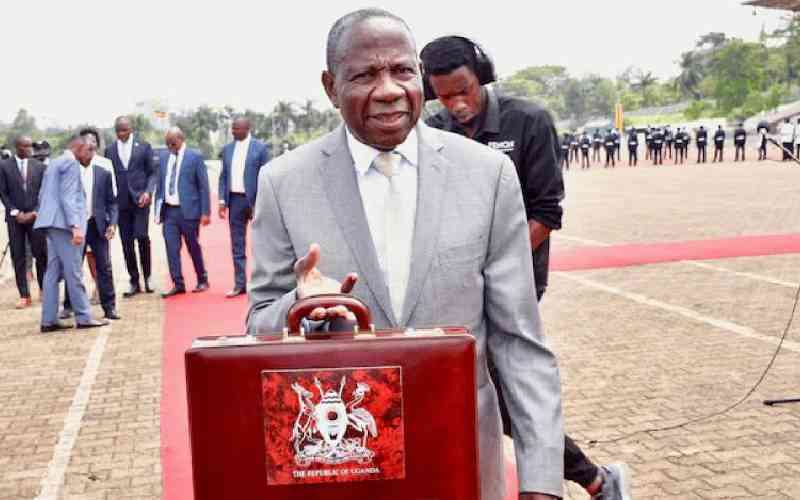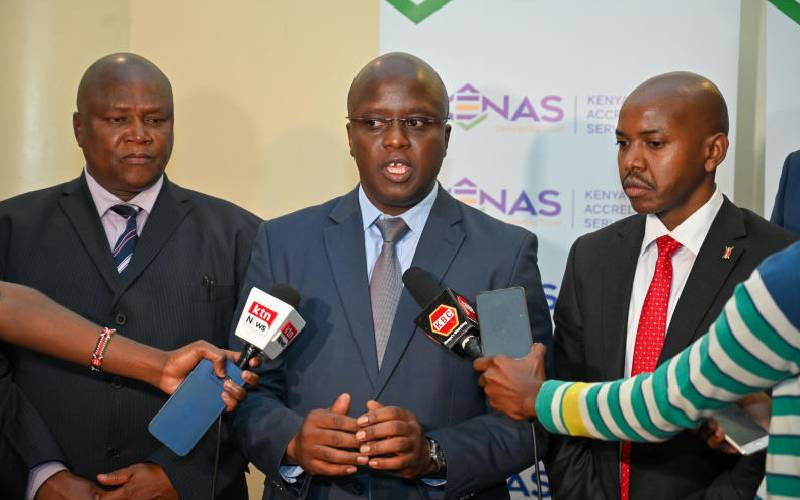
When the Hustler Fund was launched nearly a year ago, it filled many with the hopes of an era of cheap loans.
Eleven months later, the Fund officially referred to as the Financial Inclusion Fund, appears to be losing the momentum that it had in its formative days.
Borrowers who have built a credit profile with the facility are stuck and at best can only access low amounts of money while in many other instances, they cannot borrow and are always being advised to try later.
The Fund, which was initially expected to be a Sh50 billion revolving fund, has also faced budget cuts. It has been allocated Sh5 billion in the first Supplementary budget for the current financial year, a 50 per cent reduction from the Sh10 billion it had been allocated at the start of the financial year in July. Last financial year, the Hustler Fund had been allocated Sh20 billion.
The lower disbursements and loan limits as well as budgetary cuts for the Fund come even as the tough economic times and the high interest rate regime among Kenyan banks push more Kenyans to look for cheap credit.
The Fund was one of Kenya Kwanza’s key promises during the campaigns last year, which was expected to enable low-income earners and small businesses, the people whom the administration romanticises as hustlers, access cheap loans through their mobile phones. The Fund charges an annual interest rate of eight per cent, lower than commercial banks.
The pain of low amounts disbursed to borrowers was captured by President William Ruto, who last week narrated how his barber told him he has been unable to grow his loan limit despite having been borrowing and repaying loans on time from the Fund.
- State set to publish new health insurance charges
- Taking care of you: Mental well-being in a constantly changing world
- Government committed to increase AIDs funding
- President Ruto: SHIF deductions to start in March
Keep Reading
“My barber… asked me, ‘my savings in the Hustler Fund is now Sh5,600, why is it the case that my limit is still Sh5,000? Why don’t you consider the fact that I have saved Sh5,600 and increased my limit?’ It is a fundamental question,” he said, adding that he had forwarded the concerns to the CS and other players handling the Hustler Fund,” said Dr Ruto, who also underscored how radically different the Fund is “lending billions of shillings in unsecured loans and recovering it without need for drastic, expensive or time-consuming procedures... (It has) turned around the country’s fintech from predatory to responsive.”
“There are many Kenyans out there who truly know what it means to have access to affordable credit and how much difference it makes for their businesses.”
The President on June 1 launched the second phase of the Hustler Fund which targets small businesses, small investment groups (Chamas) and Saccos.
The Hustler Chama Loan is delivered through cooperatives and groups to enable members to boost their businesses and improve living standards.
Loans to groups range from Sh50,000 as the minimum amount and may grow up to Sh1 million.
Ruto, when he delivered the State of the Nation address Thursday, noted that the Fund was giving access to credit to businesses and individuals that have been denied loans due to factors such as the mainstream financial services deeming them uncreditworthy. The Hustler Fund, he noted, had proven this as false.
“The public response to the Hustler Fund has exceeded most initial projections and surprised even the most hardened sceptics. By the end of last month, the Fund had disbursed Sh36.6 billion, with Sh2.3 billion in savings and 7.5 million repeat borrowers whose overall repayment rate is at an impressive per cent. The top borrower of the fund has so far accessed a total of Sh4.5 million in 816 transactions, while the top voluntary saver is at Sh631,491,” he said.
“The Hustler Fund has proved to us not only the huge pent-up demand for affordable credit but also the readiness of Kenyans to embrace credit and savings and to pay their loans on time with minimum prompting. The notion that Kenyans are not creditworthy or high-risk borrowers is nothing more than unjust financial profiling which has, in many instances, become a needless self-fulfilling prophecy.”
One of the success stories that President Ruto highlighted in his speech in Parliament of the top borrower accessing Sh4.5 million in 816 transactions perhaps also exposes the failings of the Fund. To undertake 816 transactions in less than a year that the Fund has been in place may have meant that the Hustler Fund customer may have borrowed and repaid more than once per day.
A likely scenario is a trader taking a loan to buy stock in the morning, repaying their loan as soon his wares are sold out but has to borrow again to replenish their stock.
Analysts note that the Fund has huge potential to bridge the funding gap for many low-income earners and SMEs but appears to be falling short of bridging this gap. While the low interest rates have made the loans affordable, the low loan amounts as well as short repayment periods could be limiting for many borrowers.
XN Iraki, associate professor at the University of Nairobi, noted that the Hustler Fund should move away from lending money for consumption, while at the same time increasing loan limits and extending the repayment time for the borrowers.
“The government can increase the amount one can borrow but also require the borrower to show the intended use. We need milestones to demonstrate the money is not just for consumption,” he said.
“The Fund should also let borrowers take more money and for a longer period with more focus on investment not working capital or stop-gap measures.
The Hustler fund should be made self-sustaining like any other fund or even better make it an online bank.”
Richard Muteti chairman of Kenya National Federation of Jua Kali Associations noted that while many small businesses have benefitted by borrowing from the Fund, there are many businesses whose needs cannot be met by the Fund’s model as it is currently constituted.
“The first phase was embraced well by micro and small entrepreneurs as they would use it for operations,” he said.
“It benefited some of the entrepreneurs like traders such as mama mboga who if they get Sh1,000, they are able to restock or increase stock at their kiosks.”
He, however, noted many jua kali artisans need capital-intensive equipment and are locked out.
“For artisans, they have a different model (from other jua kali entrepreneurs) where they need equipment and they need good investment,” said Muteti.
“For this cadre of entrepreneurs to grow and improve productivity and competitiveness, they will need to automate. Automation means new technology, which is a cost factor… some of the machines that some of the artisans use require a level of investment. You will need a machine that costs, for instance, Sh20 million.”
He noted that the artisans may not benefit much from the amounts that the Hustler Fund has been disbursing, adding that the artisans are trying to engage the Fund to be able to showcase their unique needs and have products that are tailored for them.
“We are hopeful we can sit with the Hustler Fund managers for them to understand our issues from our perspective so that we can tailor a fit-for-purpose product,” he said.
Muteti added that to grow, the Fund needs to do a mid-term review that should inform how the fund lends to both individuals and businesses.
The Fund had as of November 4 this year disbursed Sh38.65 billion to almost 22 million Kenyans while total repayments stood at Sh27.88 billion. The default rate stood at 29 per cent, higher for the local commercial banks. The savings component has so far accumulated Sh1.9 billion. Under the second phase where it lends to groups, it has disbursed Sh155.63 million to about 50,000 groups.
Other than the momentum, the Fund also appears to have lost the ambition to grow. Simon Chelugui, Cabinet Secretary for Co-operatives and Micro, Small and Medium Enterprises( MSMEs), recently said the Hustler Fund was aimed at introducing low-income earners and small businesses to the formal credit market and eventually transition them to larger financial institutions once they have built a credit profile.
“The Hustler Fund is a common man’s Fund… it is a small fund. It will be used to develop, mentor and bring up Kenyans who may be disadvantaged and put them back into the financial cycle,” he said.
“We have done away with the traditional securitisation of borrowing. To understand that if you borrow, you need to pay. If you borrow frequently and repay on time, your score goes up and in the end, we can transfer that information to any leading financial institution which can use that information to give you more money.”
He adds that the Fund is a government intervention to correct a market failure whereby the low-income borrowers had no options that forced them to take expensive credit.
“We had runaway cost of borrowing… digital lenders were lending at three per cent per day, hence this initiative,” he said.
“We have been able to map every Kenyan digitally, promote financial literacy and digital knowledge as well as begin to introduce a new way of lending, that is the credit score.”
The Fund was hastily put together, coming before management and board were put in place to oversee the money that would be disbursed to borrowers as well as manage what was retained as savings whenever borrowers received their money.
The Hustler Fund has since gotten a secretariat and a board as well as regulations that govern its operations.
There have also been queries as to the source of the money that the Fund used in its initial days to lend to borrowers.
CS Chelugui has in the past explained that it has received allocations from the National Treasury in the budget.
Despite the challenges that the Fund faces at its fledgling stages, it has attracted attention from global institutions such as the World Bank and the European Union.
 The Standard Group Plc is a multi-media organization with investments in media platforms spanning newspaper print
operations, television, radio broadcasting, digital and online services. The Standard Group is recognized as a
leading multi-media house in Kenya with a key influence in matters of national and international interest.
The Standard Group Plc is a multi-media organization with investments in media platforms spanning newspaper print
operations, television, radio broadcasting, digital and online services. The Standard Group is recognized as a
leading multi-media house in Kenya with a key influence in matters of national and international interest.











